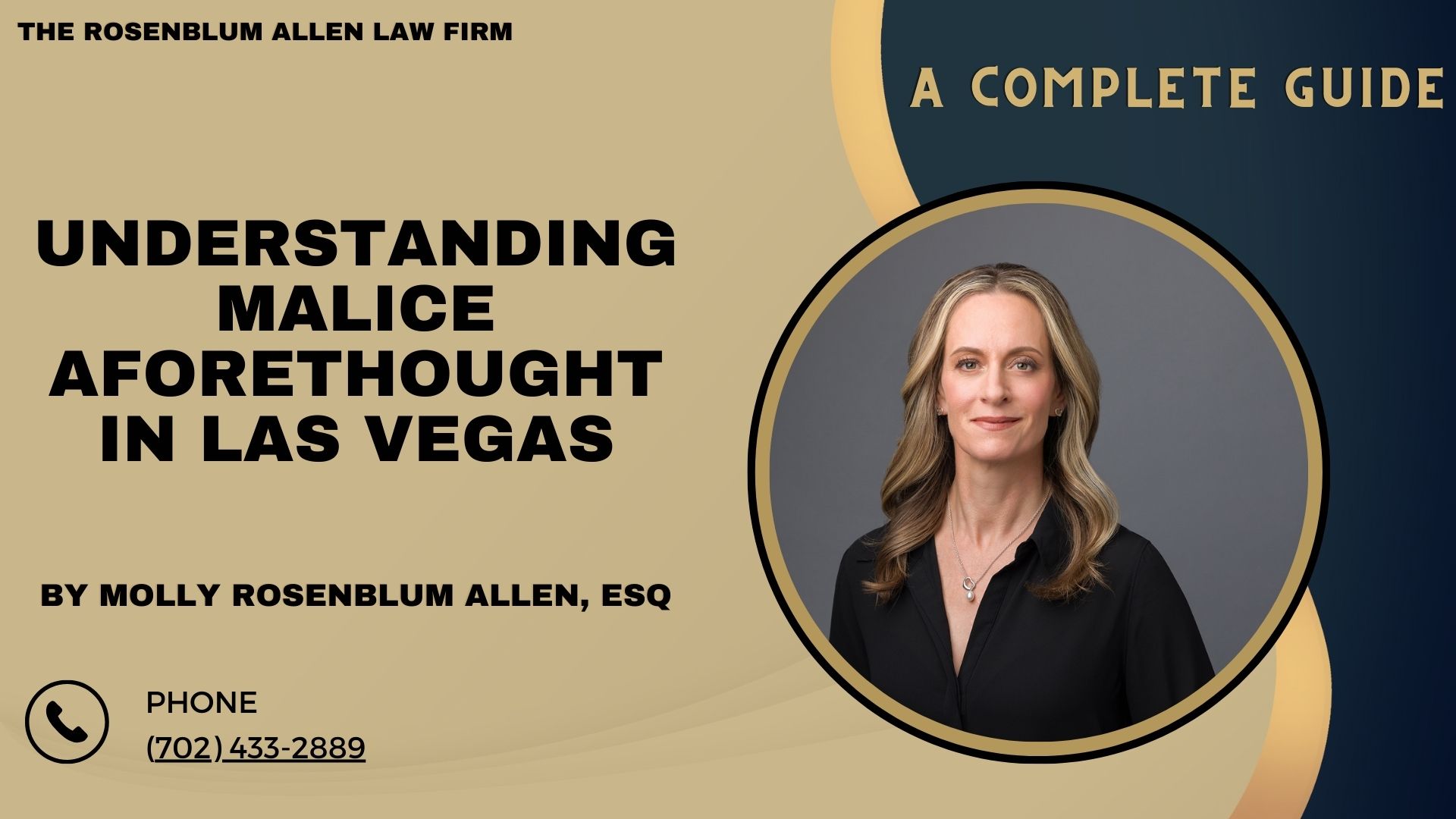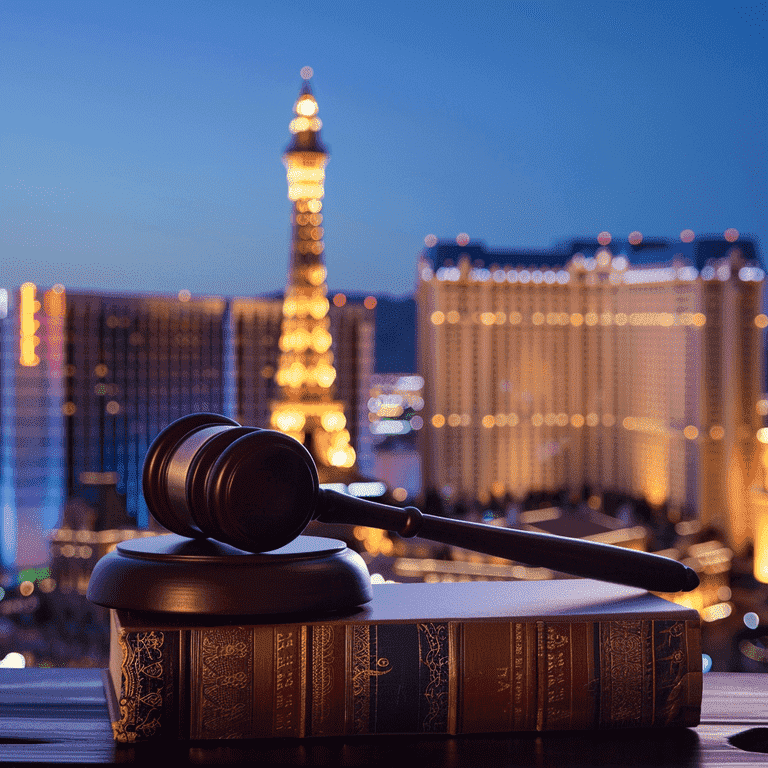We might think of sinister plots from crime dramas when we hear “malice aforethought.” Yet, in the legal world of Las Vegas, this term has a precise and critical meaning that goes beyond TV tropes. Malice aforethought is a legal concept. It separates a heinous act done on a whim from premeditated. This has big implications for those accused of severe crimes in Nevada. This guide aims to clarify this complex legal term. It will clarify things. It’s for Las Vegas residents. They might find themselves or their loved ones in the justice system.

Definition of Malice Aforethought
Historical Origins and Legal Evolution
Malice aforethought is a term that sounds like it’s straight out of a medieval courtroom, and in a way, it is. The concept was initially used in English common law. It has evolved over centuries, adapting to the changing legal systems worldwide. It is the cornerstone for distinguishing between types of unlawful killings. This is important in homicide cases.
Malice Aforethought in the Context of Nevada Law
In Nevada, malice aforethought is the intent to kill or cause serious harm. This occurs without any legal justification, excuse, or mitigation. The law recognizes this intent as a prerequisite for certain degrees of murder. It reflects the perpetrator’s state of mind before the act. This definition is crucial. We enjoy learning about the prosecution of severe charges in Las Vegas. For example, first and second-degree murder.
Distinction Between Express and Implied Malice
Express Malice: This occurs when the defendant explicitly shows an intention to kill. For example, verbal threats or planning the act.
Implied Malice: Implied malice is more about inference. It applies when someone’s actions are so reckless that they show a disregard for human life. This is true even if there wasn’t a direct intention to kill.

Legal Implications of Malice Aforethought in Las Vegas
Role in Criminal Prosecutions
Homicide Cases
Malice aforethought is the key. It distinguishes first-degree murder, second-degree murder, and manslaughter in Nevada. Understanding these differences is crucial for both the prosecution and defense.
First-Degree Murder: Typically involves premeditation and planning. The presence of malice aforethought is clear-cut in these cases.
Second-Degree Murder: It might not involve premeditation. But, it does involve malice aforethought. This reflects an immediate intention to harm or kill.
Manslaughter and its Distinctions
On the other hand, manslaughter is the act of causing death without malice aforethought. It’s divided into voluntary and involuntary manslaughter. The former involves a heat-of-the-moment action. The latter involves reckless behavior leading to death.
Impact on Sentencing and Legal Outcomes
Aggravating Factors in Nevada
Malice aforethought can greatly impact sentencing. It can turn a manslaughter charge into a more severe murder charge. Using a deadly weapon or murdering for hire are aggravating factors. They can lead to harsher penalties.
Sentencing Guidelines and Variations
In Las Vegas, the sentences for crimes involving malice aforethought vary widely. They range from decades to life in prison. The length depends on the severity and circumstances of the crime. The difference between first and second-degree murder is key. It is crucial for deciding the length and type of punishment.
This first look at malice aforethought in Las Vegas law sets the stage. It helps us understand its meaning. We will cover landmark cases. We will cover defense strategies. We will also cover the vital role of experienced lawyers. They are key for navigating these complex waters.

Critical Cases Illustrating Malice Aforethought in Las Vegas
The streets of Las Vegas have seen their fair share of dramatic legal battles. Let’s dive into some key cases. They have shaped the understanding of malice aforethought in the heart of Nevada.
Landmark Nevada Cases
Nevada has a rich legal history. It is full of cases that show the details of malice aforethought. They are landmark decisions. They provide legal precedents and gripping stories. They could rival any courtroom drama on TV.
Analysis of Key Judgments
The Case of the Jealous Lover captivated Las Vegas. Authorities charged the defendant with first-degree murder. It was for a deliberate attack on a romantic rival. The court carefully dissected the defendant’s actions before the crime. It highlighted the idea of express malice aforethought.
This was an Unintended Consequence. Another case is notable. It involved a burglary gone wrong. A homeowner was accidentally killed. This case became a cornerstone for discussions on implied malice. It showed the defendant had a reckless disregard for human life. This was true despite not intending to kill.
Role of Jury in Determining Malice
In these cases, the jury interprets evidence. They decide if the defendant’s actions are malice aforethought. Deliberation often involves complex discussions. They are about the nature of intent and premeditation. They show the jury’s crucial role in the justice system.
Precedents Set by Nevada Courts
These cases set key precedents. They guide future trials in Las Vegas and beyond. They are reference points for lawyers and judges. They show the forms of malice aforethought.
Comparative Analysis with Other Jurisdictions
Nevada’s approach to malice aforethought is interesting. It has both differences and similarities with other jurisdictions.
Similarities and Differences in Interpretation: While the basic definition of malice aforethought remains consistent across different states, the application and interpretation can vary. For example, some states might emphasize planning more. They do this when determining first-degree murder charges.

Defense Strategies Against Malice Aforethought Charges
Facing charges involving malice aforethought can be a daunting prospect. Yet, a robust defense strategy can significantly impact the outcome.
Establishing Lack of Intent
Proving that the defendant didn’t intent to kill or harm can ruin the prosecution’s case. There are several ways to approach this.
Accidental Circumstances: Demonstrating that the event was a tragic accident without intent to harm.
Mistake of Fact: Arguing that the defendant was under a misconception that led to the unfortunate event.
Demonstrating Diminished Capacity
Sometimes, the defense may argue that the defendant was not in a state to form the needed intent. This was due to mental health issues or substance influence.
Mental Health Defenses: Presenting evidence of mental illness that impairs the ability to form intent.
Influence of Substances: Arguing that the defendant was under the influence, thus lacking the capacity for malice aforethought.
Self-Defense and Other Justifications
In some cases, the individual may justify the actions that led to charges. Under certain circumstances, they may justify their actions.
Legal Requirements for Self-Defense in Nevada: The defense must prove that the defendant acted out of a reasonable belief of imminent harm.
Justifiable Homicide Scenarios: Situations where the law recognizes the defendant’s actions as necessary, such as defending oneself or others from a serious threat.

The Role of Legal Representation
In the labyrinth of legal proceedings, having the right guide is indispensable. This section underscores the importance of skilled legal representation.
Selecting a Defense Attorney in Las Vegas
Choose a lawyer who knows Nevada’s criminal law well. They should have experience with malice aforethought cases. It can make a big difference.
Experience with Homicide Cases: Look for a track record of successfully defending similar charges.
Understanding Nevada’s Legal Nuances: Familiarity with local laws and court procedures is crucial.
Building a Defense Strategy
Each case requires a tailored defense. It involves a detailed review of evidence. And it has a comprehensive approach to challenging the prosecution’s claims.
Gathering Evidence: Collecting all relevant information, from eyewitness accounts to forensic reports.
Negotiating Plea Deals: In some cases, negotiating a plea for a lesser charge is the best course of action, depending on the evidence and circumstances.
In Las Vegas, to defend against murder charges, the defense needs deep knowledge of the law. It also needs a strategic and compassionate approach. A good defense attorney can be the key to a good result. They can show a lack of intent, argue for reduced capacity, or justify self-defense.

Navigating the Legal System: Practical Advice for Las Vegas Residents
Facing criminal charges in Las Vegas may feel like wandering in a desert without a map. Here, we offer practical advice. It will help Las Vegas residents. They can confidently navigate the complexities of the legal system.
Understanding Your Rights
First, knowing your rights is like having a compass in this desert. If you’re accused of a crime involving malice aforethought:
Right to Remain Silent: Use it. Anything you say can indeed be used against you.
Right to an Attorney: Don’t navigate this alone. The proper legal counsel can make a significant difference.
Steps to Take if Accused
Don’t Panic: Easier said than done, but essential. Panic can lead to poor decisions.
Contact a Lawyer: Do this before speaking to the police. Your lawyer will guide you on what to say and do.
Document Everything: Keep a detailed record of events, conversations, and any evidence that might be relevant.
The Importance of Legal Counsel
An experienced defense attorney isn’t just a guide. They’re your advocate, fighting for your rights and freedom. They bring knowledge, experience, and resources critical for a robust defense.

Community Resources and Support
No one should face legal challenges alone. Las Vegas offers many community resources. They help individuals and their families during these hard times.
Legal Aid and Pro Bono Services
For those worried about the cost of legal representation, there are options:
Legal Aid Center of Southern Nevada: Offers free legal assistance for qualifying individuals.
Pro Bono Attorneys: Some lawyers take on cases free of charge for those who can’t afford legal services.
Support Groups and Counseling
Dealing with criminal charges can be mentally and emotionally taxing. Support groups and counseling services provide a much-needed outlet for stress and anxiety.
Mental Health Support: Organizations like the Southern Nevada Adult Mental Health Services support those struggling.
Family Support Services: Programs are available to help families cope with the challenges of a loved one facing legal issues.
Why You Have Not Hired a Felony Defense Attorney Yet
Watch this short video to take the next big step toward defending your rights against a felony charge.

Breaking It All Down
Understanding malice aforethought and the broader law in Las Vegas is hard. Navigating it is a journey filled with challenges. Yet, with the right knowledge, resources, and support, it’s a journey. One can navigate it well.
Key Takeaways
Knowledge is Power: Understanding the legal definitions and implications of malice aforethought arms you with the power to navigate your case more effectively.
Legal Representation is Crucial: The right defense attorney can differentiate between favorable and dire outcomes.
Community Support Matters: Leverage the available resources and support networks in Las Vegas to help you through this challenging time.
Facing charges involving malice aforethought can be scary. But, remember, you’re not alone. With the right prep, support, and legal help, you can navigate the complex legal system. You can work toward a resolution that protects your rights and future.

More Frequently Asked Questions
What is the difference between malice aforethought and hate crime?
Malice aforethought is the defendant’s intent before committing a crime. It applies to murder. It means a deliberate intent to kill or cause serious harm. A hate crime is a criminal act. Prejudice motivates it. The prejudice is against the victim’s race, religion, or other protected traits. The key difference is the motive. There are specific legal definitions and penalties for each.
Can malice aforethought apply to crimes other than murder?
Malice aforethought is a legal concept. In murder cases, it demonstrates the defendant’s intent. But, malice matters in other serious crimes. It shows the nature and severity of the charges. For example, in cases with severe bodily harm or some types of manslaughter.
How does the law in Las Vegas determine if someone had malice aforethought?
To determine malice aforethought, we examine the defendant’s actions and intentions. They are the ones leading up to the crime. Evidence such as planning, motive, and behavior before the act can be crucial. In Las Vegas, as elsewhere, this needs witness testimony. It also needs forensics and the defendant’s statements.
Is it possible to reduce a charge from murder to manslaughter in Las Vegas if malice aforethought isn’t proven?
Yes, if the prosecution cannot prove that the defendant acted with malice, they may reduce the charge from murder to manslaughter. Manslaughter usually implies less intent. It can be either voluntary or involuntary. Voluntary manslaughter involves a heat-of-the-moment reaction. Involuntary manslaughter involves reckless behavior that leads to death without intent to kill.
What impact does a defendant’s mental state have on claims of malice aforethought?
A defendant’s mental state during the crime critically evaluates malice aforethought. The defense can show the defendant couldn’t form the intent due to illness or impairment. This could negate the malice. This defense often requires thorough psychological evaluation and expert testimony.
How long after an alleged crime can charges be brought if malice aforethought is suspected?
The time limit for murder cases varies by jurisdiction. It depends on whether malice was a factor. In many places, including Nevada, there is no time limit for murder charges. An individual can face charges at any time after committing a crime. It does not matter how much time has passed.
Can evidence found after a trial begins affect the claim of malice aforethought?
New evidence can significantly impact a case, including claims of malice aforethought. If a trial uncovers new evidence, it can lead to a reevaluation of the defendant’s intent. It may change the trial. Both sides can present this new evidence. But, the judge can choose to allow it.
What are the potential defenses against a claim of malice aforethought?
Defenses against malice aforethought might include:
Proving an alibi.
Demonstrating a lack of intent or premeditation.
Arguing self-defense or defense of others.
Showing incapacity due to mental illness or intoxication.
Challenging the accuracy and reliability of the prosecution’s evidence.
How does the presence of an accomplice affect charges involving malice aforethought?
The involvement of an accomplice can complicate charges of malice aforethought. Authorities can charge the principal perpetrator and the accomplice with malice aforethought. It depends on the circumstances. If they shared the intent to commit the crime, they can face charges. This is often assessed through their actions, communications, and roles in the crime.
What role do plea bargains play in cases involving malice aforethought?
Plea bargains are key in cases with malice aforethought. They let defendants plead guilty to lesser charges for a reduced sentence. This can be good. It’s for cases where the evidence strongly shows malice aforethought. It allows for a specific outcome and can avoid trial’s unpredictability.

Glossary
Malice Aforethought: A legal term referring to the defendant’s premeditated intent to kill or cause serious harm to another person. It is a critical element in distinguishing different degrees of murder charges.
Hate Crime: A criminal act perpetrated against someone based on prejudice or discrimination against their race, religion, sexual orientation, or other protected characteristics.
Manslaughter: A legal term for the killing of a human being in a manner considered by law as less culpable than murder. It is divided into two categories: voluntary manslaughter, where the act is committed in the “heat of the moment,” and involuntary manslaughter, where death results from reckless or negligent behavior without the intent to kill.
Statute of Limitations: The maximum period permitted after an event within which legal proceedings may be initiated. For some crimes, including murder, there may be no statute of limitations.
Defense Attorney: A lawyer specializing in the defense of individuals and companies charged with criminal activity. They play a crucial role in the legal system by protecting their clients’ rights.
Prosecution: The legal party responsible for presenting the case in a criminal trial against an individual accused of breaking the law. This includes gathering evidence, offering it in court, and aiming to prove the defendant’s guilt.
Plea Bargain: An agreement between a defendant and a prosecutor in which the defendant agrees to plead guilty to a lesser charge or one of the multiple charges in exchange for more lenient sentencing or the dismissal of other charges.
Forensic Evidence: Evidence obtained through scientific methods such as DNA analysis, fingerprinting, or blood analysis is used to solve crimes. It plays a critical role in establishing the facts and circumstances of the crime.
Witness Testimony: Oral evidence provided by a witness under oath in a court of law. Witness testimonies can be crucial in both criminal and civil trials, giving firsthand accounts of the facts of the case.
Self-Defense: A defense to certain criminal charges involving force (e.g., murder or assault). To successfully use this defense, the defendant must demonstrate that their actions were necessary to protect themselves from imminent harm.
Alibi: A defense used in criminal proceedings whereby a defendant attempts to prove that they were in another place when the alleged crime was committed and could not have been the perpetrator.
Mental Illness Defense: A legal defense asserting that a defendant was unable to understand the nature or wrongfulness of their actions due to a severe mental disorder or impairment at the time of the crime.
Legal Aid: Services provided for individuals who cannot afford legal representation and access to the court system. Legal aid ensures that every person receives the opportunity for fair and equal treatment under the law.

Additional Resources for You
As you navigate through these complex legal topics, we want to remind our readers that our lead attorney, Molly Rosenblum Allen, Esq., has created a suite of resources to assist you in your time of need. Whether you’re seeking clarity on legal definitions, needing guidance on what steps to take next, or looking for effective advice on specific legal matters, these resources are designed to provide valuable insights and support.
Double Jeopardy: Understand the protections against being tried for the same crime twice. Learn more.
Hung Jury: Discover what happens when a jury cannot reach a unanimous verdict. Explore here.
Circumstantial Evidence: Gain insight into how circumstantial evidence can impact your case. Read more.
Indicted Vs Charged: Learn the differences between being indicted and being charged with a crime. Find out more.
Difference Between Jail And Prison: Understand the key distinctions between jail and prison. Get informed.
What Are Miranda Rights: Know your rights when being detained or arrested. Discover your rights.
How To Check If You Have An Outstanding Warrant: Find out the steps to take if you suspect there’s a warrant out for your arrest. Learn how.
What To Look For In A Criminal Defense Lawyer: Choosing the right defense attorney is crucial. Here’s what to consider. Read our guide.
Possible Ways To Reduce A Felony Charge: Explore strategies that might reduce the severity of a felony charge. Find out how.
Should You Accept A Plea Bargain: Understand the pros and cons of accepting a plea bargain. Get advice.
These resources have been meticulously prepared by Molly Rosenblum Allen, Esq., with the aim of demystifying the legal process and empowering you with the knowledge needed to make informed decisions. Whether you’re facing legal challenges or simply seeking to understand more about the law, these guides are an excellent starting point.

Outside Resources for You
American Bar Association (ABA): A premier resource for legal professionals, law students, and anyone interested in the law, offering guidance, continuing education, and information on a wide range of legal topics. Visit ABA.
FindLaw: A comprehensive source of legal information, including free legal advice for individuals, guides on the legal aspects of various situations, and directories of legal professionals. Explore FindLaw.
Justia: Offers free case law, codes, regulations, legal articles, and legal blog databases, as well as community resources. It’s a great starting point for legal research and finding attorneys. Check out Justia.
Avvo: Provides access to legal advice through Q&A forums, articles, and the ability to search for and review attorneys across numerous legal areas. Visit Avvo.
National Association of Criminal Defense Lawyers (NACDL): An organization dedicated to ensuring justice and due process for persons accused of crime or other misconduct. A great resource for finding defense attorneys and legal resources. Explore NACDL.
The Innocence Project: An organization dedicated to exonerating wrongly convicted individuals through DNA testing and reforming the criminal justice system to prevent future injustice. Learn more about The Innocence Project.

A Special Message from Our Lead Attorney, Molly Rosenblum Allen, Esq

Dear Reader,
Thank you so much for taking the time to explore our resources. I hope you’ve found the info helpful. It should empower you as you navigate your legal journey.
At The Rosenblum Allen Law Firm, we know that legal challenges can be overwhelming. We aim to give you the support, clarity, and effective representation you deserve. You may be grappling with questions about malice aforethought. Or, you may be seeking defense representation or need guidance on where to turn next. We’re here to help.
I invite you to schedule a free consultation with our team. They will assist you further. This is a chance for us to understand your situation better. We can give some advice and talk about how we can support you going forward.
Please don’t hesitate to call us at (702) 433-2889 to arrange your free consultation. We’re here to stand by your side, offering our expertise every step of the way.
Thank you again for your trust and time. We look forward to the opportunity to assist you.
Warmest regards,
Molly Rosenblum Allen, Esq.
The Rosenblum Allen Law Firm


